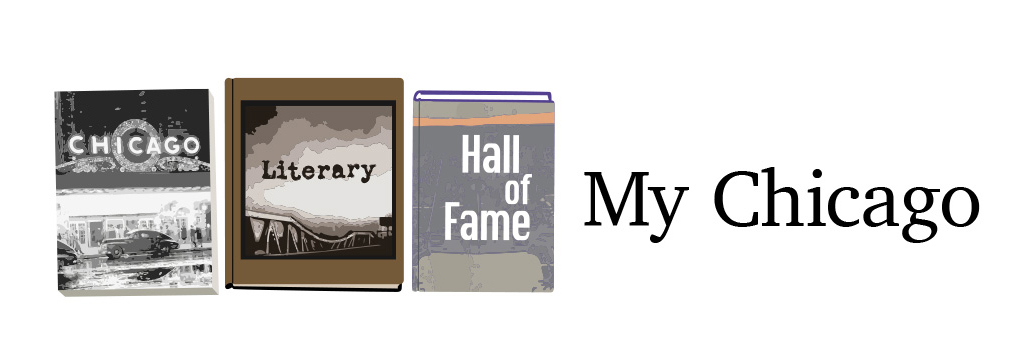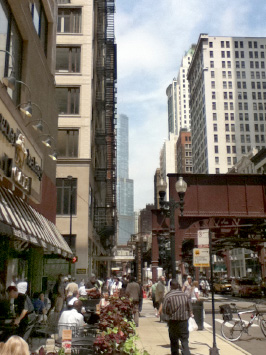My Little Free Library
by Donald G. Evans
In Oak Park, and certain Chicago neighborhoods, you see, every few blocks or so, these miniature wooden structures that store books. Most are made to look like little houses, maybe a barn, and in some cases there is a real commitment to design. There is one I like on south Cuyler Avenue painted a lovely orange with white trim for the windows, red for the small door, and a shingled dormer. Another one I like has black-eyed Susans painted into a bright color scheme. Of course, these are all over the country now, and I’ve seen replicas of the actual homes at which the structures rests, tiny mobile homes, police boxes, telephone booths, ships, all kinds of interesting and imaginative styles that make for great lawn ornaments.
But they are not merely lawn ornaments. They are meant as little free libraries, and the idea is that anyone, anyone at all, is invited to take or leave books. It’s my habit to carry around books to give away: I keep some in a box in my car trunk, and I keep a few in my backpack on walks. These are books that duplicate titles already in my collection, or that were left over from Chicago Literary Hall of Fame sales, or that I just simply don’t rate highly enough to take up my limited shelf space. Often, I’ve grabbed these extras cheap at garage sales or book fairs, or else they were given to me.
I stop, almost without fail, when I spot a little free library. I leave one or two, usually three books, and as I am rearranging the shelves to fit my donations, I look. I’m always hopeful that I’ll find a gem, or at least something I want for my own collection. But I have a big collection, and in amassing so many books I’ve gotten fussier and fussier about what constitutes a worthy book, even if it is free. No ripped or torn copies. No former library books with all the ghastly stamps and markings. No moldy or water damaged paperbacks. And, of course, the title has to be intriguing, something high quality and preferably with a Chicago connection, since Chicago books constitute a considerable portion of my collection.
So, it’s seldom that I actually take a book; I mostly just leave a few. But on that rare occasion when I stumble upon a nice hardback edition of Jonathan Lethem’s The Fortress of Solitude, or an old paperback copy of Stan Mikita’s biography, or a decent later edition of Meyer Levin’s The Old Bunch…. I am truly delighted.
My wife Margaret, on walks through the village, has many times been annoyed when I say, “Hang on, I want to look.” My son Dusty, eager to get where we’re going, has tried to talk me out of pulling the car to the curb so I can jump out and peek. Given that Margaret and Dusty find this hobby of mine grating makes their birthday gift to me even more special. A week ago, when I turned 55, the two schemed to acquire a little free library kit and hide it away until my birthday. I was surprised and more than that grateful: so many gifts, at this stage of my life, mean so little, but this was different.
I am excited to have the library in my front yard, though it must still be painted and assembled. The Chicago Literary Hall of Fame logo will go on there. What else? I am not handy, to put it politely. In my house, when a lightbulb goes out, I just don’t use that room for a while. But it feels like I need to imagine the design and at least help with the work in order to stamp my own personality on it. I’m picturing some combination of vintage Chicago book jackets, literary quotes, some kind of antique typewriter script. Too elaborate perhaps, but my plan is to enlist somebody much more skilled than myself to transform ideas into a worthy destination planted next to Margaret’s rose bushes.
Not every aspect of the little free library system thrills me. I have my complaints. Too often, the books that get left are complete garbage, even putting aside literary tastes. What I want to get across is the idea that this new little free library, the Don Evans version of the little free library, will be, maybe for the first time, a highly curated take on what’s out there. DO NOT treat my free library as a recycling or, worse, garbage, bin. Keep your shitty books to yourself. I do not want to be the middleman between somebody else’s dumpster books and the actual dumpster. I want to indicate, somehow, that this space is valuable.
If I spot somebody leaving The Bridges of Madison County, I will chase them down and politely say, “No thanks.” I will discourage the deposit of chemistry textbooks from 1978 and paperback copies of Gone With the Wind that survived but not really the flooded basement. I will root out the midnight intruder who looks one way then another before slipping into the library a half-finished coloring book or a mostly completed crossword book.
It’s not just free books that make this interesting. It’s the idea of exchange. People giving up books that are valuable to others and finding different ones valuable to themselves. What irritates me is that the people leaving these old textbooks and tattered worthless romance novels know that nobody else could possibly want them. I suppose these are the same people that donate puzzles missing a few pieces to Good Will, or a DVD that skips to Salvation Army.
Throw all of that stuff away, is my point. Leave something that you imagine finding a good home, that will be treasured or at least appreciated, even if it’s not something you want to keep.
There is work to be done, but I relish it. I’m picturing Chicago Literary Hall of Fame pamphlets, weekly themes (Young Adult, perhaps, or Sports), flyers promoting, no, sharing, news of literary events around the city. I suppose I won’t be able to sit outside on the stone bench that will be near the free library, but I do want to see people as they find something they like. Maybe I’ll keep vigil in the sunroom, discreetly peeking from behind the curtains, or maybe install a surveillance system, like Jay Cutler set up to spy on his chickens.
In any event, the possibilities are there, and I look forward to exploring them. My big hope is that as 55 becomes 60 and 60 becomes 65, the neighborhood will be able to whisper about the Crazy Old Free Library Guy and I’ll be able to nod from behind my curtain, “Yep, you’re looking at him, Sonny.”



